Are you wondering what makes a GREAT information product?
Below, you’ll find a 6-step (updated) guide that will help you create info products that sell.
Here’s what we’ll be learning in this guide:
- How to create an info product
- How to launch an info (minimum viable) product
- How to promote and sell an info product
- What to pay attention to when launching a new product
We have a lot to cover, so let’s get started.
Steps to Creating an Info Product That Sells
Step #1: Brainstorm Information Product Ideas
Many of you may be wondering what exactly an information product is.
On that note, let’s kick things off by giving a simple explanation on this.
Information product definition
An information product (or info product) is any digital product that conveys knowledge or specific information, in the context of educating the user around a certain topic.
Building an information product isn’t as easy as selling information online (and unfortunately, that’s what many people think it is).
Now that you know what an info product actually is, let’s look at what the first step of the process is all about.
The first step toward creating a truly successful info product is to brainstorm information product ideas.
These ideas don’t have to be complex or profound.
In fact, the simpler the idea, the higher the chances your info product will succeed.
You may be wondering: Where can I find such ideas?
Here are some of the best and quickest ways to get info product ideas:
1) Take a look at best selling information products
The real question here is: how to create an information product that sells?
You can achieve this by taking a look at what’s already out there—by taking a peek into best selling info products.
For example, let’s say you want to create an information product around sales.
What you can do is to visit already successful products, like Grant Cardone University:
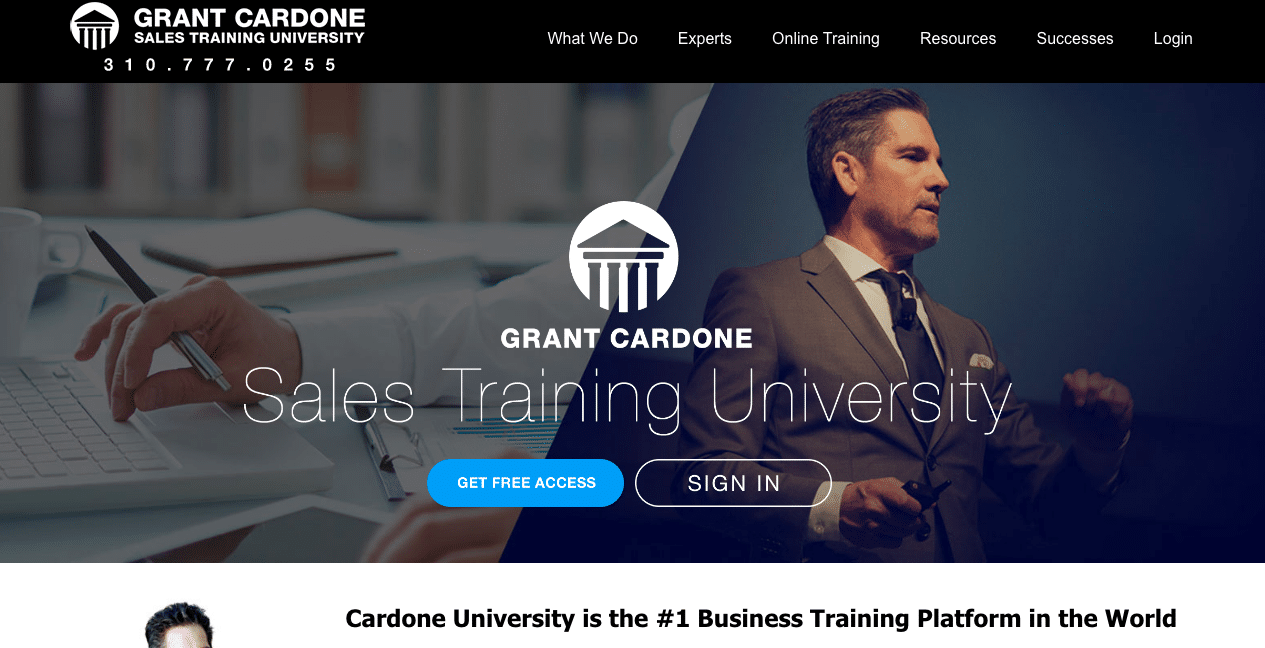
Image Source: Cardone University
Top selling information products can be an excellent source of inspiration in the first stages of the process.
Visit as many as you can and note down things like:
- Value proposition
- Pricing model
- Messaging
You can easily find such products using Google search:
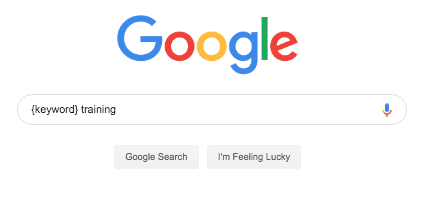
For example, if you want to get ideas for sales-related information products, you can search for something like:
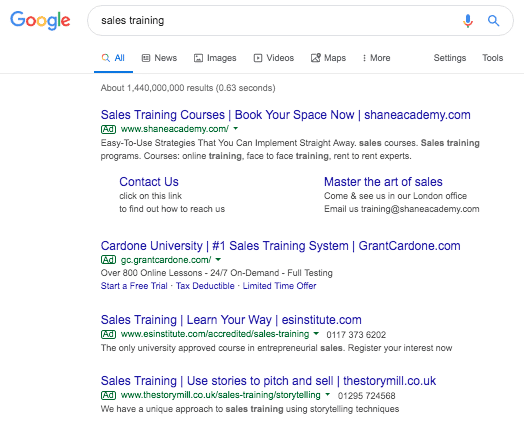
This can be your starting point toward brainstorming and discovering great info product ideas.
2) Browse Udemy courses
Selling information online is NOT easy.
Luckily for you, others have done it already.
Udemy is a place where people go to learn new skills and acquire knowledge based on their interests.
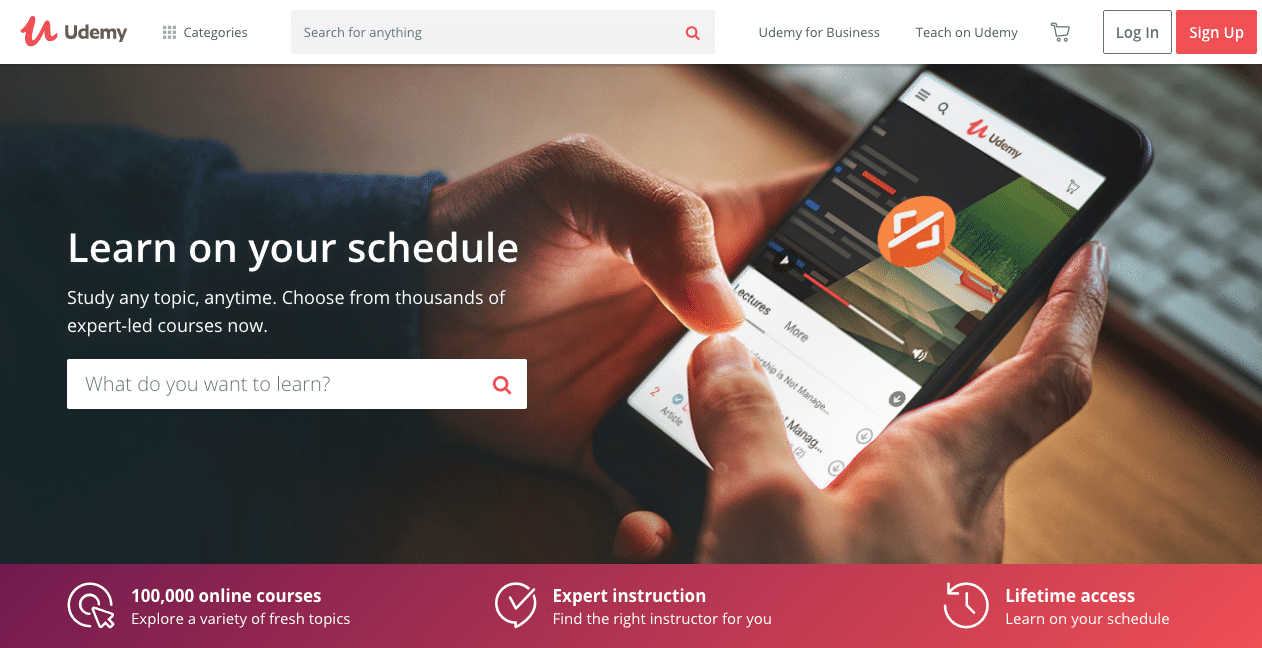
Image Source: Udemy
To find ideas for your informational product, just enter some keywords into the search bar at the top of the page:
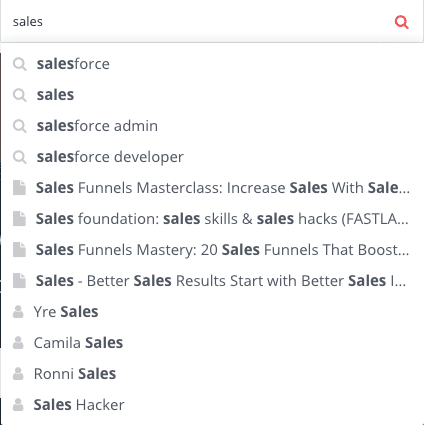
Image Source: Udemy
Click on the most relevant one and start breaking down the elements of their success.
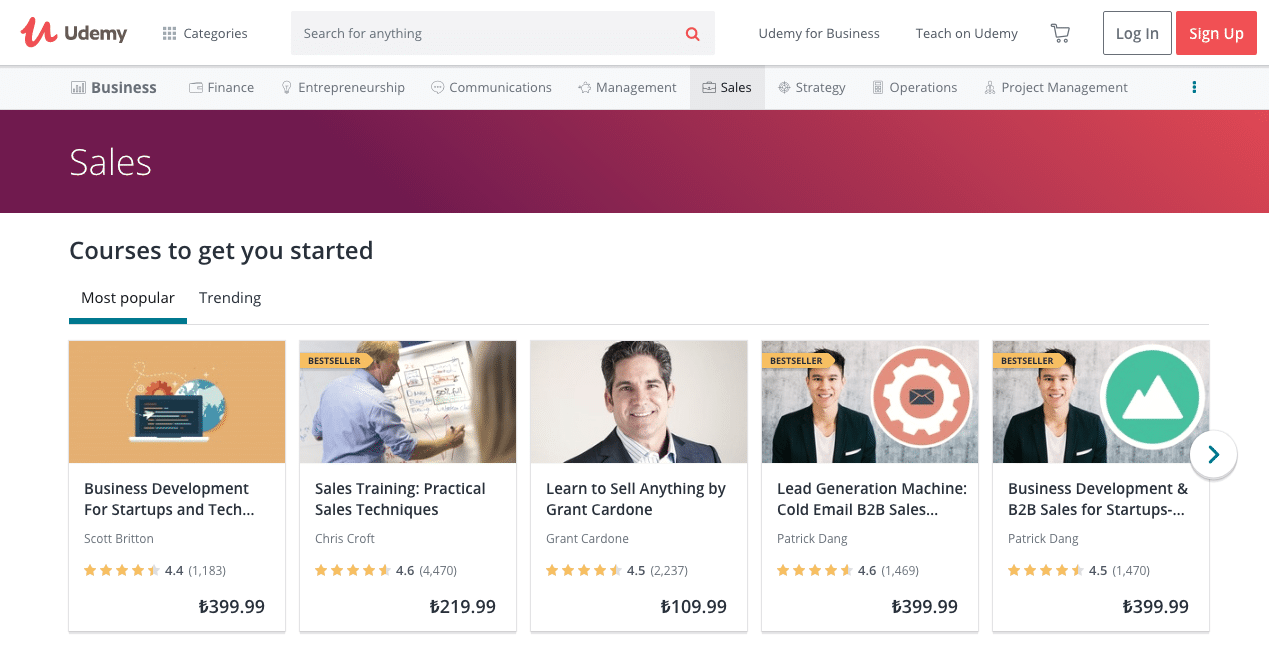
Image Source: Udemy
Could that make a successful info product?
If yes, you can add it to your list.
3) Do research based on authorities in your niche
How to create an info product that sells?
Find authorities in your niche and see how they package their services.
To do so, you can visit websites like Clarity.fm or GrowthMentor.
Here’s what Clarity.fm looks like:
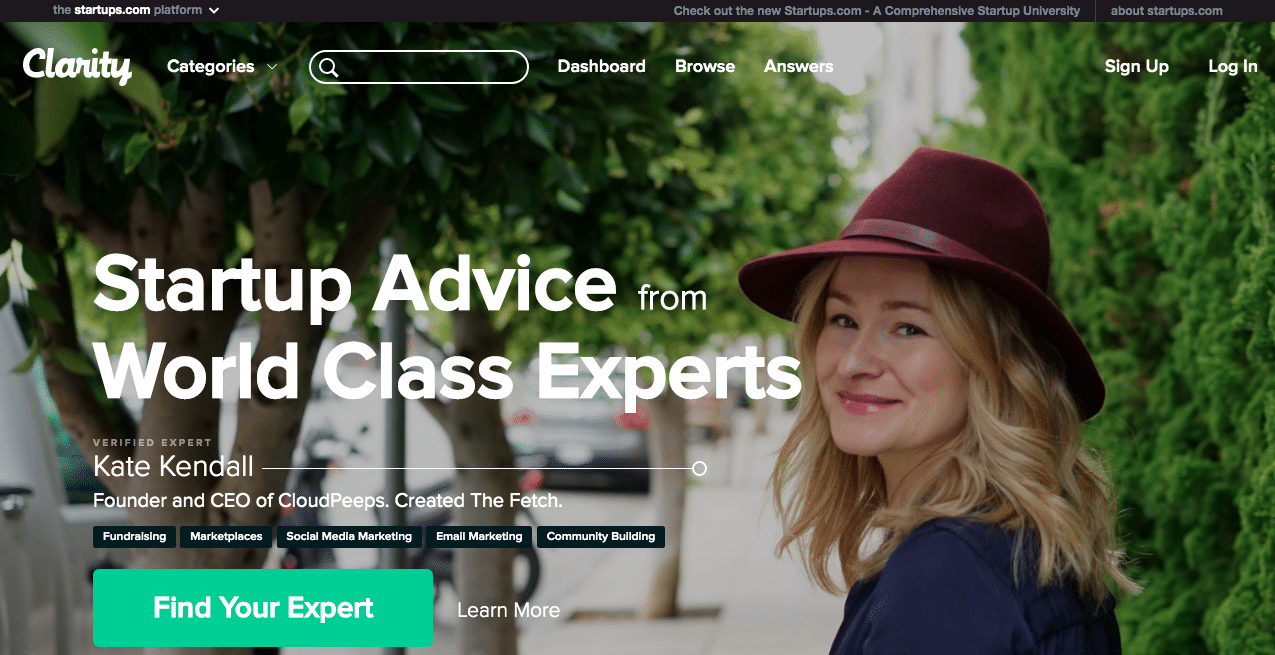
Image Source: Clarity
And here’s how GrowthMentor looks:
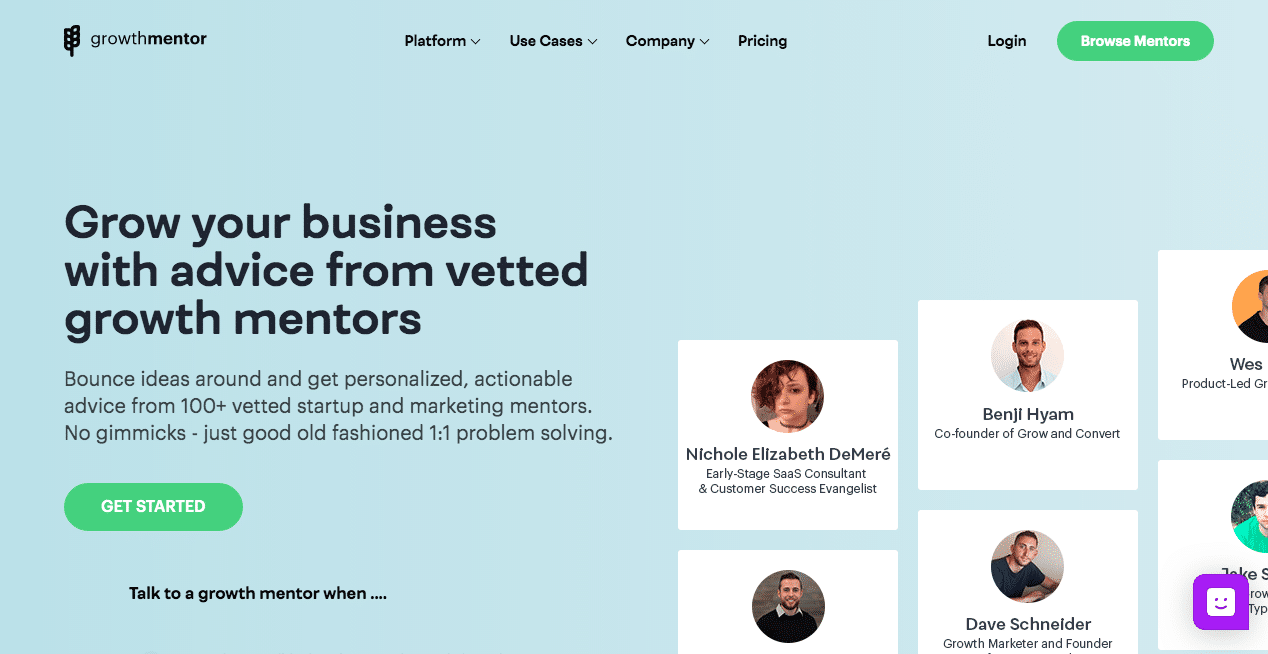
Image Source: GrowthMentor
The good thing about these platforms is that they can show you what skills are in demand right now.
For example, if you do some quick research, you’ll find out that everything that has to do with…
- Product growth
- Product-led growth
- Product marketing
… Is in high demand right now.
This could be an opportunity for your information product.
Create a list of information products
After you’ve browsed the internet for a while, you might want to write down your info product ideas.
A simple spreadsheet here will do the trick.
Just note down your ideas, as you’ll have to choose the type of the idea you’re going to build upon in the next step of the process.
Author’s Note: For best results, be sure to write 20-30 information product ideas in general.
Let’s move on to the next step.
Step #2: Choose the Type of Your Information Product
In this second step, you need to choose the type of your information product.
To do that, you need to know what the various types of information products are.
Let’s take a look at some of the most common ones.
Types of information products
Some of the most common information product types are:
- E-books
- Checklists
- Training platforms
- Courses
- Mini-degrees
- Worksheets
- White papers
- Webinars
A common misconception among many online entrepreneurs and business people is that you can call something a product only if it has a price tag on it.
However, that’s far from accurate.
An information product can also be something you offer for free for a particular purpose.
If you browse around StartBros, you’ll notice that we offer many information products for free for our audience.
For example, here’s a webinar we’re offering for free:
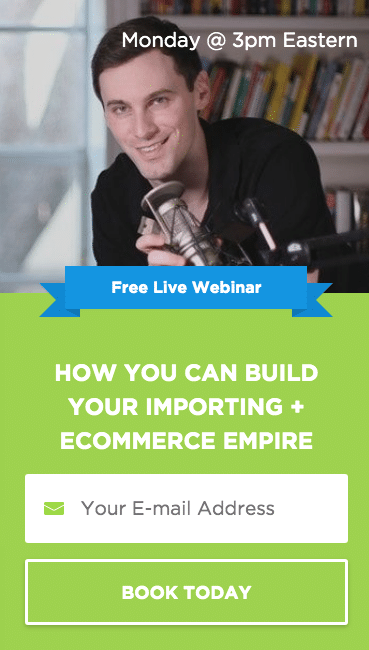
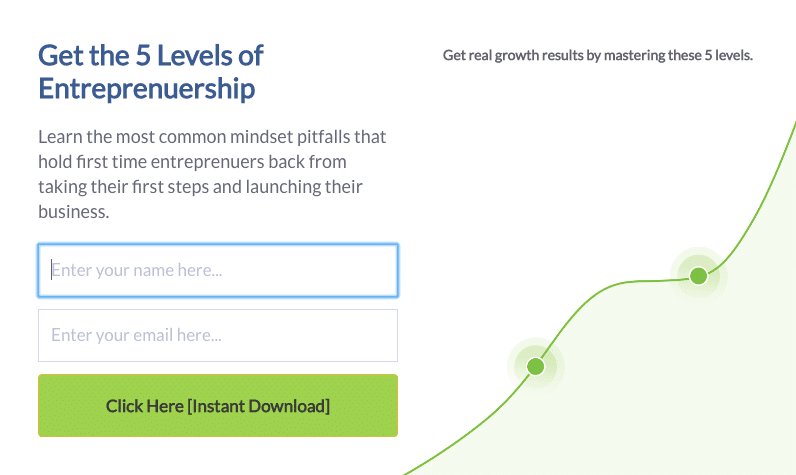
Author’s Note: We also have a very cool blog post on the 6 types of entrepreneurs that you might want to check out.
Or an Amazon product research Workbook for ambitious Amazon FBA sellers:
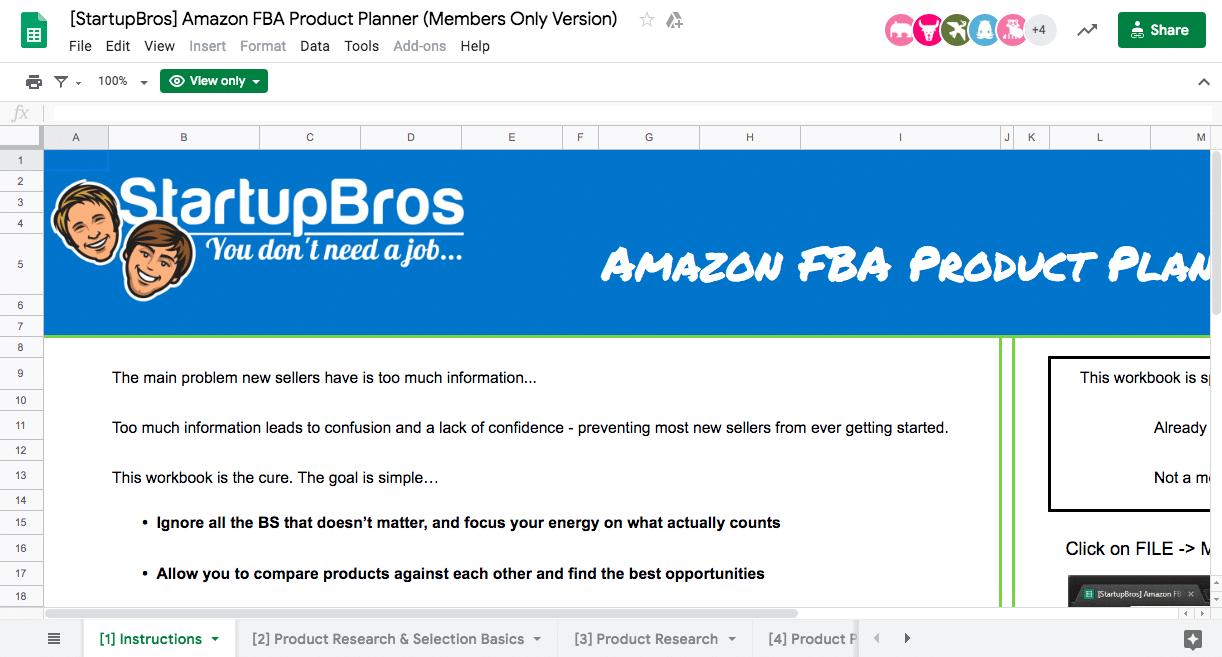
We offer all of these resources, along with in depth Amazon articles for free.
Of course, we have paid products as well, such as our flagship training program: E-commerce Empire
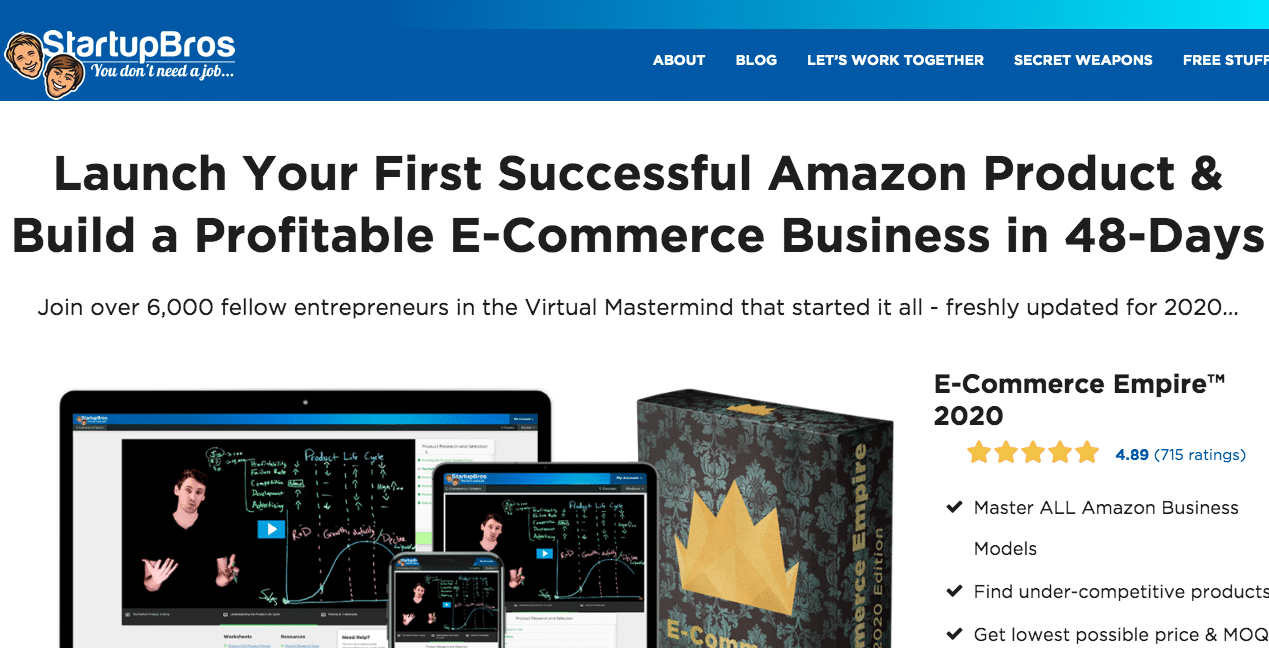
By the time people buy our training program, they’ve extracted value from our website multiple times.
Most of the time, that’s what makes people take some kind of monetization action.
It all boils down to this: selling information products means you need to add some value to your prospects before you can ask them to pay for your product.
You simply can’t sell information products without adding value beforehand.
What Type of Information Product is Best For You
My advice is to go with the type that makes you feel most comfortable.
Do you feel GREAT in front of the camera? Then go for it.
Is writing content your thing? Then give it a try.
Are you the best at creating templates? Then don’t hesitate.
Do what makes you feel most comfortable and happy.
In the end, that’s what creating an information product is all about.
However, something you need to keep in mind is that people find it easier to consume and buy when you combine different types.
Thus, you may have a flagship product but still definitely need to build other products around it.
Let’s move on to the next step.
Step #3: Define the Basic Elements of Your Product
So far, you’ve chosen an idea for your info product from among the ones you discovered in the first step.
You’ve also chosen the type of informational product you’re going to create.
At this point, you need to define the basic elements of your info product.
What are these basic elements?
The framework you can use to define them is the popular Lean Canvas Framework, created by Ash Mauyra.
What is the Lean Canvas? According to creator Ash Maurya:
“Lean Canvas is a 1-page business plan template that helps you deconstruct your idea into its key assumptions using 9 basic building blocks.”
These blocks are:
- Problem
- Solution
- Key Metrics
- Unique Value Proposition
- Unfair Advantage
- Channels
- Customer Segments
- Revenue Streams
- Cost Structure
Here’s how the template looks:
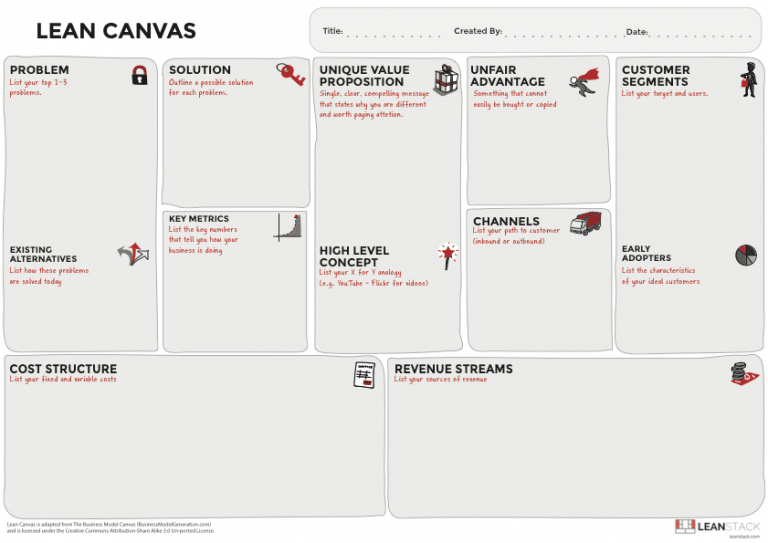
Image Source: Lean Stack
The good thing about this framework is that it helps you organize your thoughts around the information product you’re going to build.
By defining basic elements like the Cost Structure and the Channels you’re going to use to promote your product, you have a basic strategy in place.
Of course, many of these things are going to change as you move forward.
Nevertheless, defining them from the very beginning is a great way to know where you’re heading.
To get a better understanding on how to use the framework, let’s see what the Lean Canvas template would look like for my E-commerce Empire training program:
1) Problem
People want to be financially independent but can’t escape the 9-5
2) Solution
They can be financially independent by becoming eCommerce entrepreneurs
3) Key Metrics
Courses sold per quarter
4) Unique Value Proposition
Launch your first successful Amazon product & build a profitable E-commerce business in 48-Days
5) Unfair Advantage
Have launched a dozen successful eCommerce businesses myself
6) Channels
- Search traffic (organic)
- Affiliations
- Amazon micro-communities
7) Customer Segments
Want-to-be entrepreneurs
8) Revenue Streams
Training program
9) Cost Structure
Fixed price with money-back guarantee
Easy, right?
Be sure to use the template for your own information product.
Step #4: Validate Your Info Product Idea
Most people fail to sell info products because they skip this step.
In fact, most people don’t know that validation is a critical step toward creating successful digital products at all.
So what exactly is validation and why should you care about it?
Validation allows you to confirm whether an idea you have has a chance of succeeding.
It’s also one of the most critical steps when starting a new business.
You are using validation as a way to determine whether your information product will be of interest to your target audience.
Here’s an example of a validation question for an info product on Facebook:
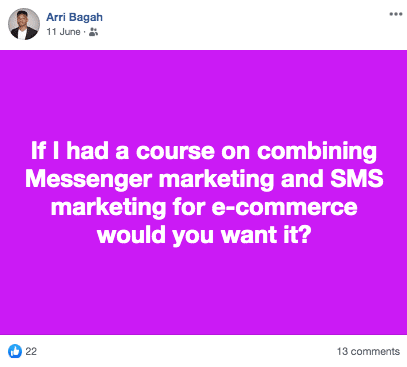
Image Source: Facebook
With this simple question, the creator of the course is able to identify:
- If the course he is going to create is interesting
- The number of his potential early adopters
- The names and other details on his early adopters
It’s very important to do this for almost everything you create online, before making further investments and commitments toward them.
Here’s another validation question, again from the same marketer on Facebook:
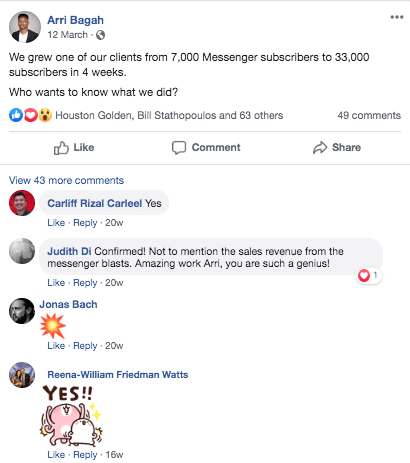
Image Source: Facebook
As you can see here, the engagement is even bigger.
It also clearly shows that the creator can move forward in creating a case study for his client, since there are a lot of people interested in learning more about that case study.
I guess you get the point.
If you want to sell information online, or just want to launch a free info product, ask what people think about it first.
The feedback you’re going to get will help you refine your product before launching it.
Step #5: Create & Launch Your Information Product
Now that you know…
- The product you want to create
- What type of product it’s going to be
- The basic elements are of your product
- If there is an audience for your product and who that is
… You can start building your product.
Based on my experience in building and launching information based products, some of the things you need to pay attention to when creating and launching such a product are:
1) Make it actionable
The info product you’re going to create has to be actionable.
Make is as simple as possible, while also explaining every step in detail and adjusting your messaging so that it doesn’t include complex words and jargon.
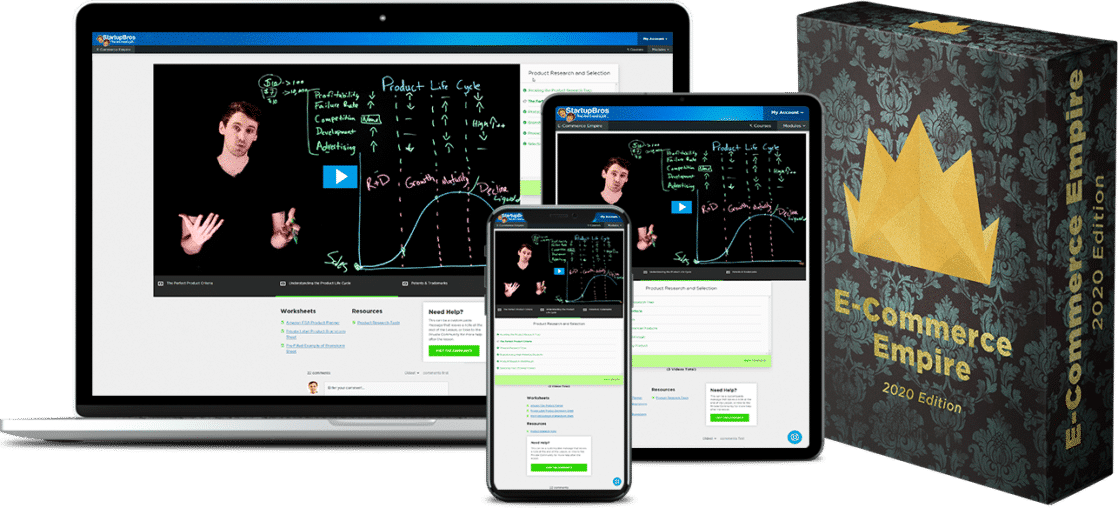
For example, in my course, I go into detail and explain every step that people watching should take to launch a successful eCommerce business.
You need to do the same.
2) Provide real-life examples and case studies
Has what you are going to cover ever helped someone achieve great results?
Make sure to mention that in your informational product.
People LOVE case studies and successful examples of how others made what they are craving for.
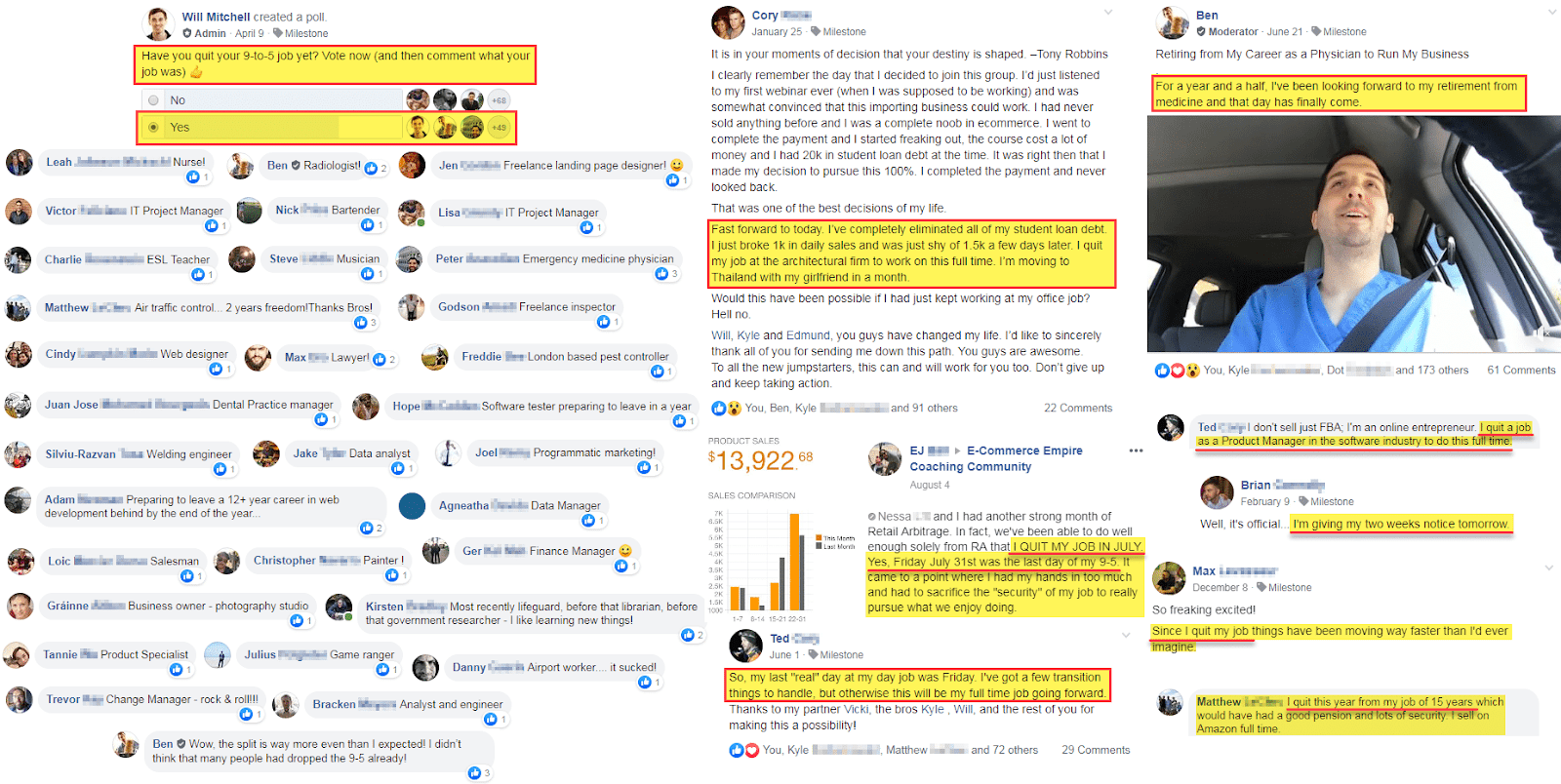
In my course, I include cases of people who managed to quit their jobs after taking it.
There’s no better way to sell an information product.
3) Ask the opinion of already successful people in your industry
I have to be honest here: successful people are often hard to reach.
Even so, if you have the chance, you need to ask for feedback from authorities in your industry.
They’ve been where you are, so getting their opinion on things is a must.
Just send them a polite message, asking them to take a look at your info product before it goes public.
Trust me, it’s well worth it.
4) Remove hesitation by offering a Free Trial or Money-back Guarantee
When you sell information online, it’s easy to be misunderstood or misinterpreted.
Many people think that they’ll buy your course and get rich overnight.
However, this is not the case for most info products.
Moreover, many other people will hesitate to take the leap and buy your product.
A Free Trial or a Money-Back Guarantee here will help you in the beginning.
In my own informational product I offer both a Free Trial:

And a 90-Day Money-Back Guarantee:
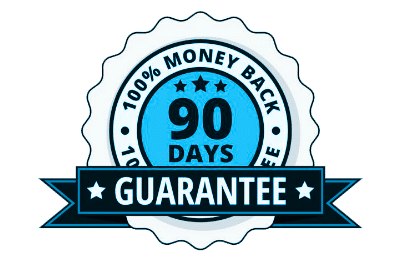
It really works.
Be sure to use it.
5) Show your potential buyers what kind of support they’ll receive after buying the product
This is the last tip I have for you in this section.
Most successful information product companies offer great support to their customers, even after they’ve bought one of their products.
In fact, info products require constant support, since people who bought the product may need further explanation or even consultation for some of the topics you cover.
I’ve seen this happen time and time again.
Be very specific with the kind of support people should expect from you.
Step #6: Find Ways to Promote & Sell Your Information Product
You now have a great information product.
This is where things get difficult.
At this point, you need to get out of the building and start actually selling your product.
How can you do that when you’ve never done any marketing or sales before?
Luckily for you, there are other ways you can sell your info product.
Here are some of the best ways to promote it:
1) Paid advertising (i.e. social and search ads)
Paid advertising is one of the quickest ways to get your information product in front of your target audience.

Image Source: Facebook
There’s one problem with this method though: people have become extremely negative when it comes to advertising.
That doesn’t mean that you can’t use it to reach your audience, but just keep in mind that many advertisers see their number of clicks go down because of ad fatigue.
2) Affiliate marketing
Affiliate marketing is a great way to sell your course.
To put it simply, affiliate marketing allows other people or websites to promote your info product on a commission basis.
This means that they get paid not for the traffic they drive, but for the sales they drive.
One of the best places to start with affiliate marketing is Clickbank:
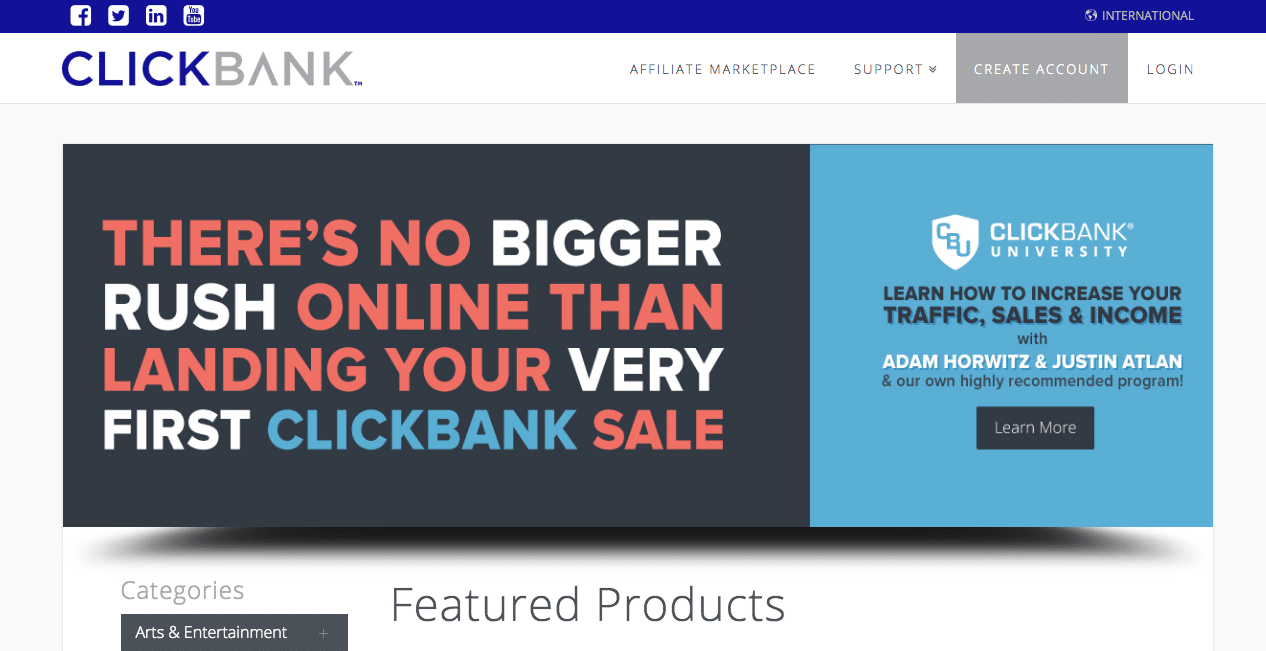
Image Source: Clickbank
Make sure to check it out.
3) Partnerships
Partnerships can also be a great way to promote your informational product.
The logic behind partnerships is easy: you find businesses who have similar target audiences with you and decide to help each other out.
To give you an example of how that works, let me explain how we at StartupBros handle partnerships.
We partner up with serious businesses that add value to the Amazon ecosystem and have similar audiences to ours.
Such a business could be a tool like
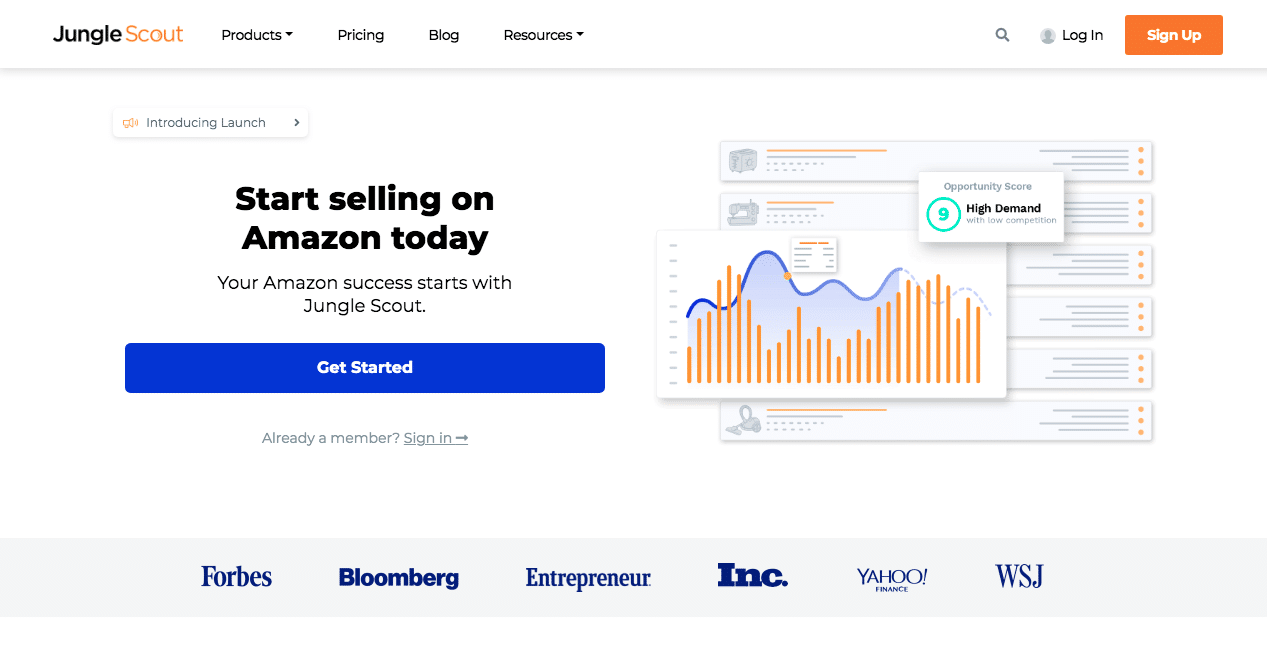
Image Source: JungleScout
Establishing partnerships will bring highly relevant traffic to your info product and will allow you to scale faster.
4) Direct sales
This one is self-explanatory.
Using direct sales to sell an info product has two main drawbacks:
- It isn’t scalable
- You need people to do it right
On the other hand, interacting with people while trying to sell to them allows you to identify their pain points and problems and adjust your messaging around them.
Sales can be hard, but if done correctly they can drive initial growth for your new product.
5) Social selling
Next, you can use social selling as a way to attract people who will buy your info product.
Social selling is the action of adding value to your prospect’s lives and giving answers to their questions where they live online.
For example, if we wanted to promote our Amazon course, we would start by answering some questions on Quora:
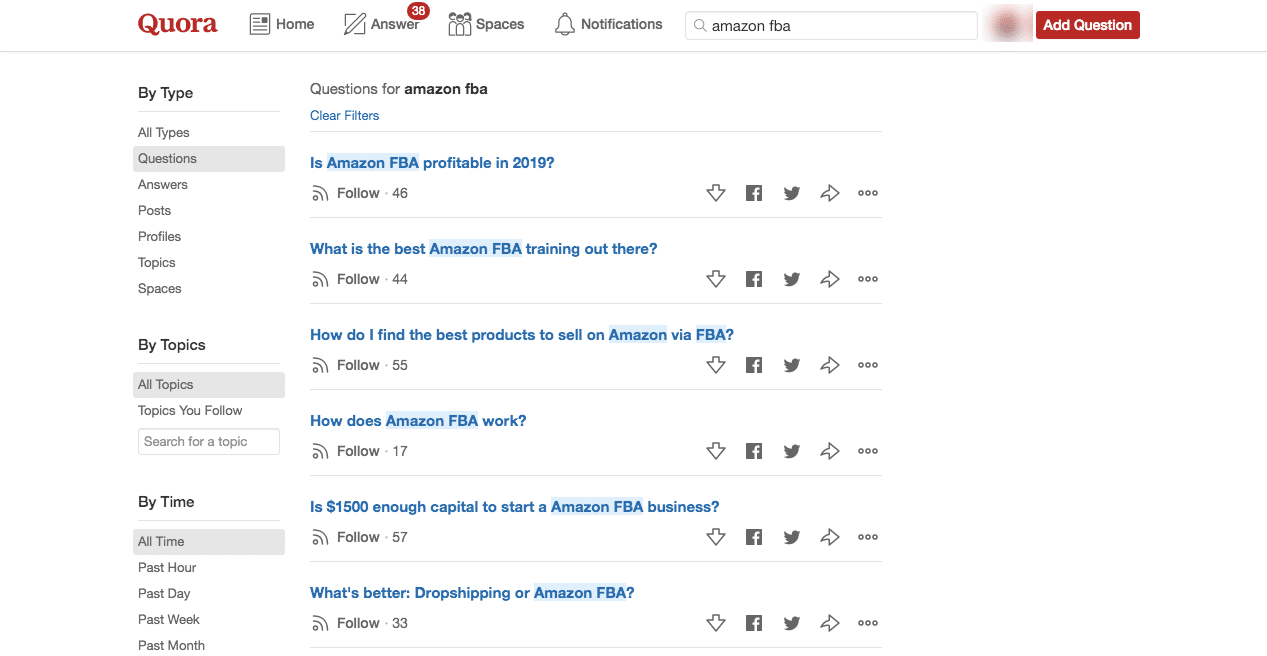
To get the most out of this strategy, you need to find where you potential customers live online and try to answer any questions they have regarding the topic you cover with your info product.
Slowly but steadily, you’ll establish yourself as an authority and drive traffic to your informational product via several channels.
Author’s Note: Try to find all the communities where your potential customers live online and use them to give valuable answers whenever you think is relevant.
6) Build a community around your product
Building a community is one of the best things you can do to generate awareness about your product.
It’s also one of the best ways to keep people who have already purchased one of your products engaged, so that you can up-sell them in the future.
Some tools you can use here include:
- Facebook groups
- Slack channels
- Meetups
- Events
Rest assured that this tactic, combined with the previous one, is the best combination you can try to grow your information product business.
Let’s move on to the last section of this guide.
Now Over to You
Creating information products is easier than it used to be.
People today have all the means they need to create GREAT products at scale.
On the other hand, selling info products is NOT as easy as it used to be.
Why?
Simply because nowadays, there are just too many of them.
However, this doesn’t mean that you can’t create a successful info product business yourself.
After all, you now have all the necessary tools to do so.
Now I’d like to hear from you:
Which of these steps do you find to be more difficult? Is it defining the basic elements of your info product, or maybe selling your product?
Let me know by leaving a comment below!
Additional resources you might be interested in:

Something I would be interested to know more about is the actual process of creating the informational product. I.e., if someone wants to make interactive educational courses, how would one do that?
Something more complex than making videos and posting them to a site while charging a fee. Like are there services that help with that or are best for making these?
Wonderful article, greatly enjoyed. Thank you!
I’ve been reading a lot about informational products. I didn’t really get these were “Digital products” in disguise. I already create course to educate entrepreneurs on social media, video, and email marketing. Always learning something new from you guys!
Great content Will I am interested in selling information product on my site and this exactly what I need to start . Thanks
Hey Moses, thank you for checking out the article! If you run into any questions don’t hesitate to ask a question
Hi, I am so inspired by this. I have been interested in selling information product for a while now but I didn’t know how to go about it until I read your post.
I will begin with the tips you have suggested and let you know how it goes
Hey Whitney, thank you for checking out the article and reaching out. You can do it! If you have any question at all please don’t hesitate to reach out.
Hi I am willing to create a digital product of my own to sell in the market can you help me to find the perfect niche for that
We can absolutely help you Rohit, send us an email bros@startupbros(dot)com and we would love to talk about it!
Kyle, how do you get past the objections (that will have to be addressed in the sales letter or video) that deal specifically with “why should I listen to you?”, “what makes you an expert?” type of objection that are certain to be there. That has been holding me back from doing an info book on copywriting. I have a TON of training, some small (not really significant or saleable) successes, my best being I was hired for 6 figures ONCE. I trained personally under the late Gary Halbert and he made me read and study a TON of classic ad writers, I went to AWAI writing school, bla, bla bla… the only real question people want to know is “how much have you made from any one sales piece?” or “what is your best conversion rate?” followed by “How much did it make you?”…etc.
Hi Kyle!
I want to create a digital product for my ecommerce store as a VIP Loyalty program monthly subscription… when you say “find relevant youtube videos” is it allowed to use other youtube videos in our paid course? At the moment i use other peoples videos on my blog as free content and link back to them but having a link back to them in my course is not strange? Could you please clarify? Thanks!
Hi Kyle,
This is pretty awesome. I have learnt a couple of things reading this. My new information product is dropping soon and I have been contemplating on doing a video version of it too. Thank you so much.
Emenike
😉
Nice to have you here, bro.
Nice meeting you here sir. This content is really important and have thought me a lot today
Thanks for this article. Very informative.
However, can you talk a bit more about getting proper permission? I feel like if I reached out to a bunch of experts in a certain field (and maybe conducted skype interviews or something), they would not be happy that I would be profiting off their interviews/content.
Do you usually have to make a deal with them ahead of time that expert contributors will get a certain %?
No way man! You don’t need permission. They are agreeing to help you out. Sometimes you might need to do something like creating a deal but if you are honest and upfront ahead of time then there should be no issues.
Great article! As to PLR, I´m using them too. However, I wouldn´t recommend just purchasing a PLR product and selling it. I think, today there is lots of free info out there that is of higher quality then most PLR products, so that the quality of most PLR products doesn´t justify paying for it, given all the free information out there. However, if you use PLR as a “starting point”, as a foundation that you can build upon, and add more value so that you can justify charging, it´s a great way to create a product quickly and easily.
thanks so much for this post, please can you share us an idea of where and how to resell these products?, looking forward to read from you soon.
This has really been helpful, I want to know how you can create your own sales page in marketing your product and how can be paid automatically after the product has been downloaded.
Certainly food for thought – thank you
Hello Kyle — and thank you for this wonderful information!
A few questions:
1. What are the rules of copyright when creating information products that involve other subjects?
2. Is it honorable and required legally to get the “approval” of each subject before transcribing and using it commercially, especially if it is audio or video (i.e. their image/likeness/voice is being used)? Are there exceptions?
3. Is it ethical to profit without including them in the share?
4. What strategy/approach have you used to communicate your intentions, protect yourself legally, and still honor the subject(s)?
Please advise. Thank you in advance.
Hi Mike, I would love to know more about what you do and how much you charge.
Thanks for making it sound so easy. It’s so encouraging. I’ve been searching blogs and the authors are usually economical with the truth.
My main question is how do I sell ebook? I know of Amazon. Is that the best way to sell my ebooks ?
Point 3,Chinese never pay for digital goods,e-book is not an exception.
Great read. This is something that I did previously. I would approach and schedule a Skype call and have that recorded. Fortunately, there is also a free software that can record the call into MP4. Bundling 4-5 experts talking about the same or similar topics would make for a great product.
You don’t mind I share this article on blog right?
I would love you to share it 🙂
Thanks Kyle
… very helpful!
I would like to learn exactly how to produce my own information product, and your article has helped a lot!
Joanne
Thank you for sharing this article with us, it is a very good one and i would like to add just one single thing; watch the Gurus and the Experts out there very closely when they try to sell something or when they present their products because 90% of the times what they tell you to be careful about or to be aware of is exactly what they use “against” you to make you buy (which is not illegal) their products. It is one of the best skills you could have if you can learn it and copy it. Thanks
Great point Richard
Hi Kyle,
Great post, really inspiring for newbies who want to get their product created FAST.
I think that you should also mention that it’s possible to get an expert to create your products for you if you have the money to invest in your own information empire. For this example, I’m a product creator and have been creating products for my customer to sell as their own, and obviously it’s better than PLR quality wise.
When you get your products created you want them to provide VALUE if you want long-term customers and you’re serious about making full-time online. Do it the RIGHT WAY right from the start and people would love to pay you for your information products.
Thanks, Kyle. I hope that this helps a bit more.
Great points, Mike!
Thank you very much for this article! I was home on sunday feeling very discouraged about my business. And when I came across this it opened my eyes of to a lot of things. Thank you Sooooooo Much Sir. I greatly appreciate it. God Bless you!!
Glad you ennoyed it, hope you can use it!
Thanks, guys!
I’m still working on my site and building a product was giving me anxiety. This helps a lot. I’ll also seek to use it in the NGO of which I am the president.
Good stuff! Thanks again.
I’m glad this was useful for you! Thanks for joining the community 😀
Super super post. Reminds me of TV interviewers who become respected authorities from interviewing experts.
Thanks so much for this post,I’m totally new to information/online marketing, please can you share us an idea of where and how to resell these products?, looking forward to read from you soon.
Hey man,
I was sceptical when google threw up your page as the top hit for my search on ‘create information products’ but, what you’ve said here is actually turning my brain over and helping me think clearer about how I’m gonna make these products and sell em. Nice one dude!
Glad to turn a brain over whenever I can! Looking forward to seeing what you make!
I agree that you can create a great product by compiling the expertise of others and if you are a beginner then that’s a good way to get a product of your own created.
However, I do believe that you should become an expert yourself so that you have that credibility – you own that credibility!
Kay
Absolutely! I think you naturally become an expert at whatever it is that you’re studying. Eventually anyway. What do you find with most of your clients?
Yes that’s true I have found that. It’s great when you see it dawning on one of your clients that in fact they have now become an expert in an area of their niche!
Fantastic! Would you be willing to share some of the success stories you’ve had with coaching?
I won’t share specifics but in order to create information products for any niche you need to know your topic.
I have a PDF that I give out in my coaching programs that enables anyone to see exactly what it is they know and just doing that exercise is a real confidence booster.
You often know more than you think – when you write it down!
Thanks for the chat Kyle!
Hey I agree with you %100 about using the expertise of others when you dont have much knowledge. We do it all the time. In fact I would love to use your article complete to write a ebook and do an ecourse on the subject with your permission to demostrate your technology. I think all your Ideas are so true that is must be shared with others beside thoes who visit your website. It will be a way spreading the good word to others. Even if there is a charge or fee for the knowledge its all the same. The word is being spread free or not free.
I definitely agree that in the beginning you need to be a super modeler but you’ll always have someone to look to for modeling or great innovative aspects.
I found that a really awesome way to get your own zip on something is to get five of the top books, audios, and videos on a subject and just smash them out and able as much of it as you can. You end up creating a weird spin or way of doing something because you get like 15 different versions of how to do something.
It’s a great way to innovate or figure out something awesome. I mean books are books written about books. But I’ve found getting weird patterns developed that can breakthrough to something awesome comes from how you mix certain ingredients.
Kinda like mixing colors and coming up with a new one. I do that with information. At my website I show how to create a information product for anyone who is having trouble with that. If you’re interested just check out MichaelDavidGowans.com